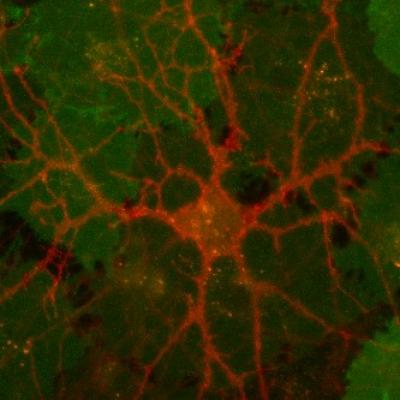Researchers develop a wider spectrum for dLight1 sensor, allowing multiplex imaging of neurotransmitters

Credit: UC Regents
Sacramento, CA– In 2018, Lin Tian and her team at UC Davis Health developed dLight1, a single fluorescent protein-based biosensor. This family of highly specific sensors detects dopamine, a hormone released by neurons to send signals to other nerve cells. When combined with advanced microscopy, dLight1 provides high resolution, real-time imaging of the spatial and temporal release of dopamine in live animals.
Recently, Tian and her team succeeded in expanding the color spectrum of the dLight1 sensor. In an article published Sept. 7 in Nature Methods, they introduced two new spectral variants of dLight1: the yellow YdLight1 and the red RdLight1.
“The new sensors will help researchers to detect and monitor different information processing activities in the brain,” said Lin Tian, associate professor of biochemistry and molecular medicine and the lead author on the study. “With the different colors, we will be able to see multiple neurochemical release and neural activities at the same time.”
The RdLight1 permits the simultaneous assessment of dopamine, pre- or post-synaptic neuronal activity and the glutamate release in specific types of cells and neuronal projections in animals. Its increased light penetration and imaging depth provide enhanced dopamine signal quality. This allows researchers to optically dissect dopamine’s release and model its effects on neural circuits.
As a neurotransmitter, dopamine plays an important role in movement, attention, learning and the brain’s pleasure and reward system.
“These exciting new tools opened a new door to developing color-shifted neurochemical indicators. Together with other tools, they have great potential to unlock the mysteries of brain chemistry in health and disease,” Tian said. “The knowledge we gain from these sensors will facilitate the development of safer next-generation therapies to neuropsychiatric disorders such as depression, anxiety, schizophrenia and addiction.”
###
The coauthors on this study at University of California, Davis are Tommaso Patriarchi, Junqing Sun, Ruqiang Liang, Chunyang Dong, Kyle Pugher, Grace Or Mizuno, Carolyn M. Davis and Brian Wiltgen, and at the University of California, San Francisco are Ali Mohebi, Aaron Marley Mark von Zastrow and Joshua D. Berke.
This work was supported by National Institutes of Health grant (DP2MH107056); BRAIN Initiative awards (U01NS090604, U01NS013522, U01NS103571, U01NS094375); Rita Allen Young Investigator Award and R01DA045783; Olga Mayenfisch Foundation; and Novartis Foundation for medical-biological Research.
Article: Patriarchi et al. An expanded palette of dopamine sensors for multiplex imaging in vivo, Nature Methods. https:/
Media Contact
Nadine Yehya
[email protected]
Original Source
https:/
Related Journal Article
http://dx.




